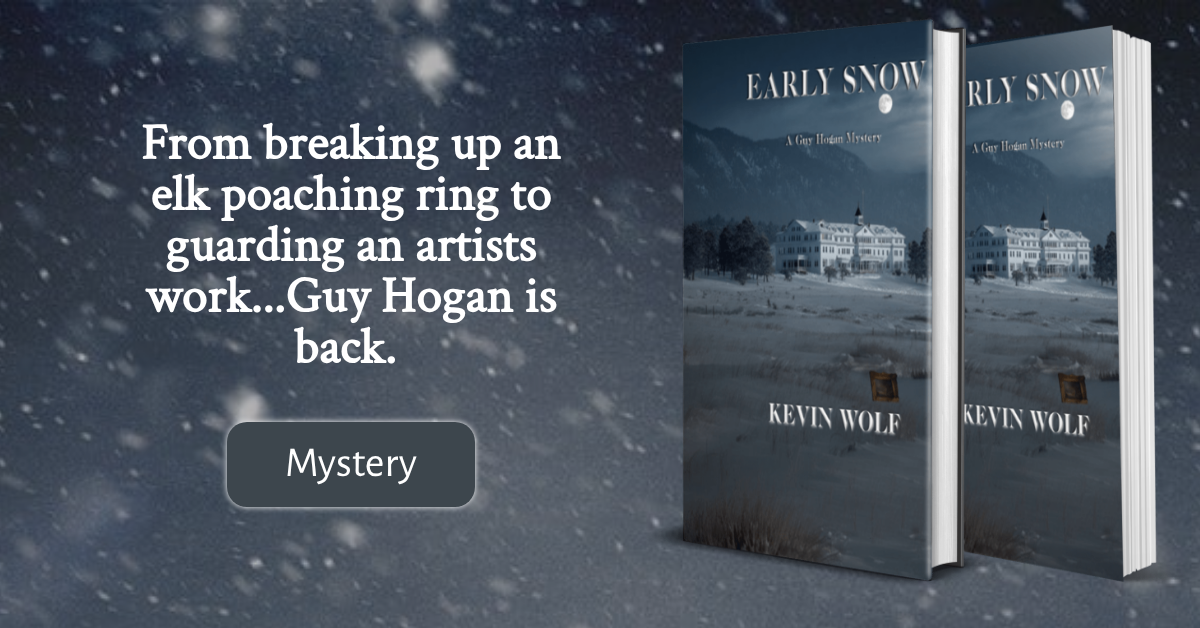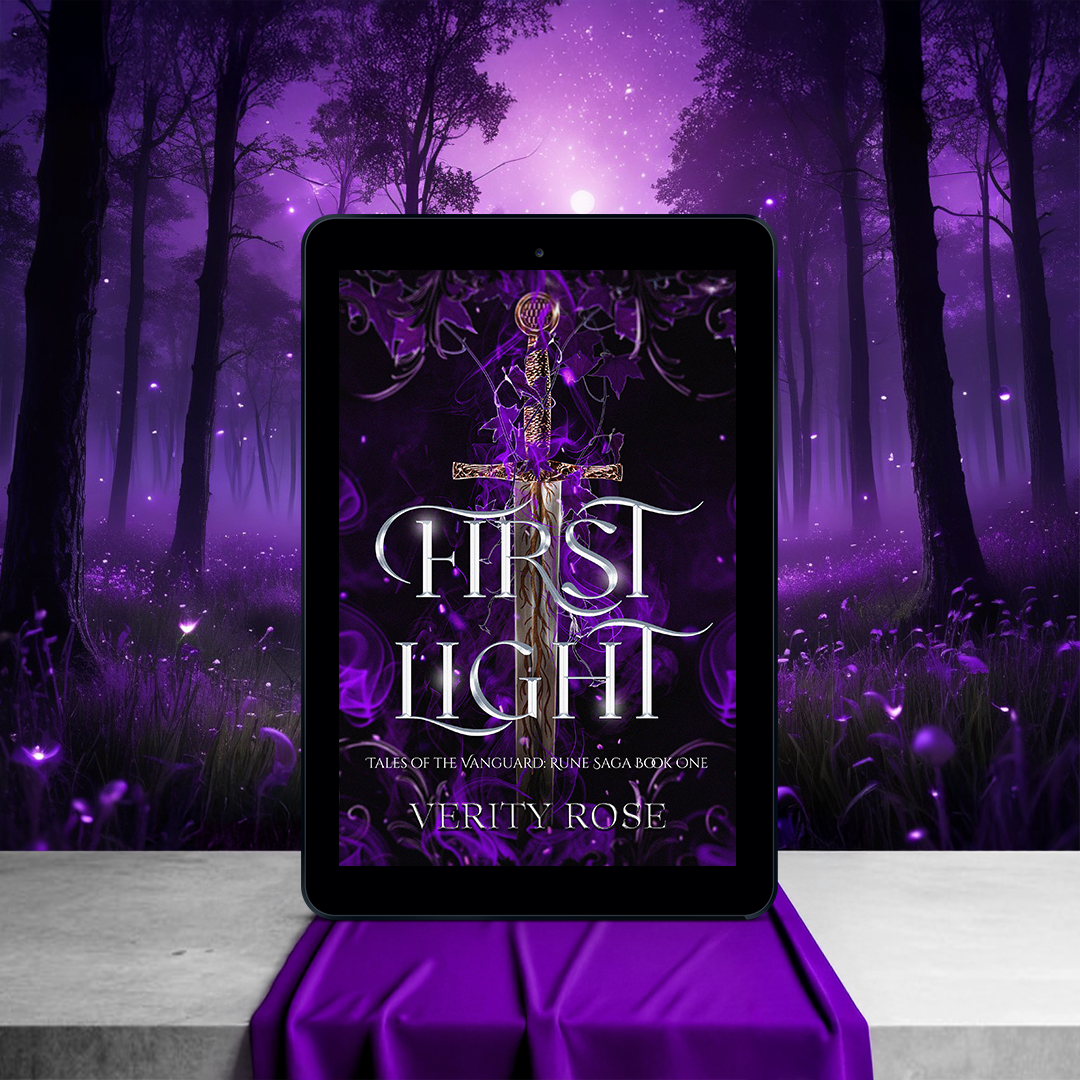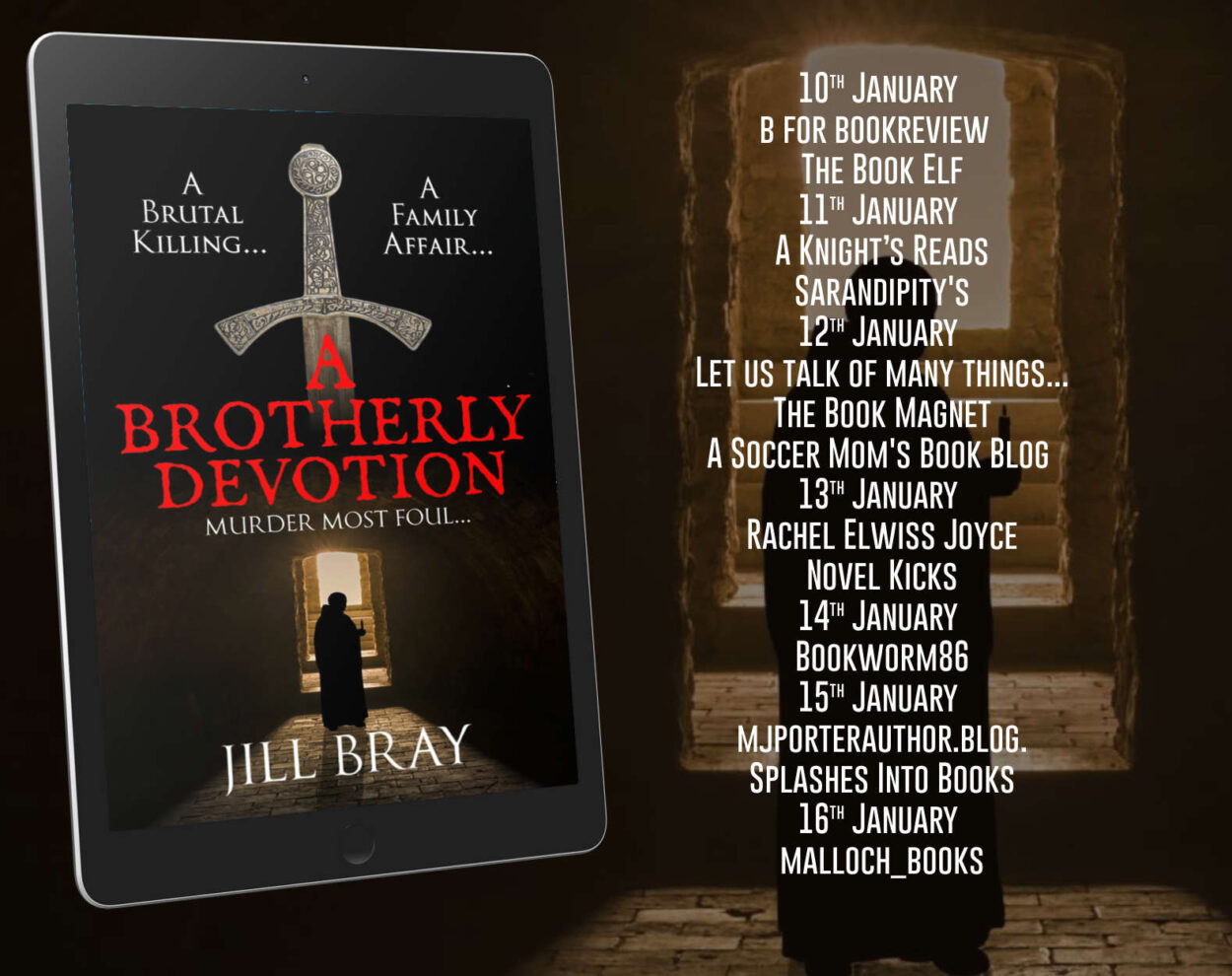This book event is through RABT Book Tours and PR.
Early Snow book tour includes a giveaway and an excerpt.

Book Details
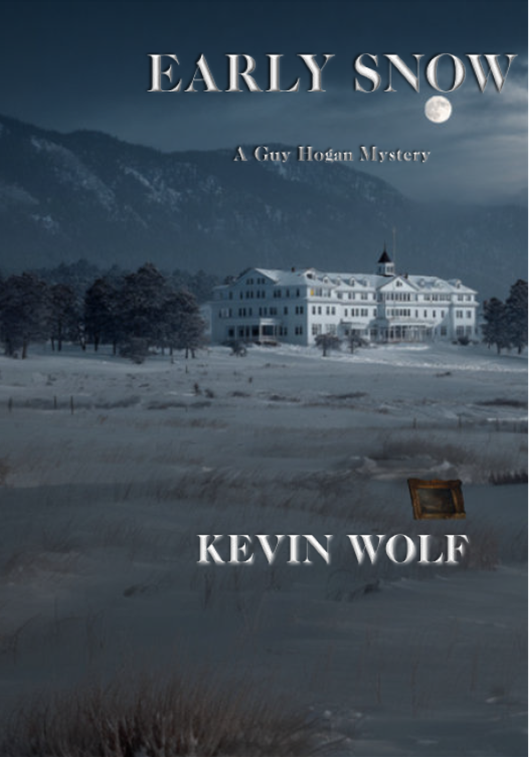
Mystery
Date Published: 11-15-2025
Odyssey Pruit paints pictures of the ghosts and spirits she saw in the halls of an old hotel where she worked ten years before. GUY HOGAN doesn’t believe in ghosts. Hogan is hired to guard Odyssey’s pictures for her first art show in the same old hotel. When an early blizzard closes the roads, knocks out the power and telephone, Hogan is trapped in the hotel with Odyssey’s quirky fans. When imps and ghouls make their presence known, Hogan questions his doubts, and the answer could be murder.
Opening Scene
By noon, the autumn sky had turned from blue to the color of
road asphalt. Treetops bent in the winds funneling into the canyon
from the high peaks. Stray snowflakes splattered the windshield,
turned into tiny droplets, and in an instant were gone.
My best friend and new boss, Dalton Cummings, pulled his pick-up
into a parking spot at the back of the big, white hotel and killed
the engine. “The truck with the paintings is supposed to be here in
about an hour.” He pulled up the sleeve of his flannel shirt and
checked his Timex for the tenth time. “We’ll leave our gear in the
pickup. I’ll let the hotel manager know we’re here. You see if you
can find,”–He snatched a clipboard from the dashboard and flipped
through the pages–-“damn it, I can never remember her…”
“Porsche Hurt,” I told him. “Porsche. Like the car. Hurt,
like ouch.”
“That’s one of those damn made-up New York City names if I’ve
ever heard one. Her folks never gave it to her.”
“You’ve said that before.” Then it hit me. I held back the
smile. “I know what’s going on. Ex-game warden Dalton Cummings is
nervous about his first paying job since retirement. What could it
be?” I enjoyed the edge I had over my friend.
Cummings turned toward the window. His breath painted a gray
haze on the glass.
“Let me guess.” I wanted to see his face, but he wouldn’t turn
back. “The man who fought forest fires, rescued lost campers, and
saved fish and wildlife for generations to come is afraid of a New
York woman.”
“That ain’t it.”
“Then what?”
He shook his head, and the brim of his Stetson left a mark on
the fogged window. “I don’t like hotels,” he mumbled.
“What?”
“Hotels.” He clamped both hands on the steering wheel. “I’d
rather be in my own bed.” He stared straight ahead. “I do fine in a
sleepin’ bag in the backcountry. But there’s somethin’ about a
little old mint on a fluffy pillow and turned-down sheets that makes
me all crawly.” He shook like he was cold. “It’s all too fancy.”
“Don’t worry.” I bit back a laugh. “It’s just two nights. You
probably won’t get any sleep anyway.” I couldn’t resist adding one
more thing. “The ghosts will keep you awake.”
Cummings jerked up on the door handle and glanced sideways at
me. He raised his middle finger. “Screw you, Hogan.”
The art work
The light from the five lanterns brightened the room. Shelby set
easels along the wall and put five more between the piano and the
windows. Porsche and I opened the crates. Ms. Randolph showed each
painting to Odyssey and the two selected where it would be placed.
“Hogan, take a look,” Shelby pointed at the first row of
paintings. “Look familiar?”
“That’s the elevator in the lobby, right?”
A man and a woman stood in the elevator. A bellman had wheeled a
luggage cart of suitcases in next to them. A room key hung from the
bellman’s pocket. All the faces blurred in the dark so that I seemed
to see these people only from the shoulders down. The bellman’s hand
pressed the button for the fourth floor. Subtle brush strokes added a
tiny pair of hands near the buttons. Those fingers pressed the button
for the second and third floors.
Ms. Randolph moved beside us. “I can almost hear the little
ghost giggle, can’t you? Now the elevator will stop on every floor.
Such a naughty little child.”
“Look close, Hogan,” Shelby said. “See the number on the room
key in his pocket. Four seventeen. Isn’t that your room?”
“Yeah.” I swallowed hard.
Ms. Randolph smiled. “Odyssey has a talent for doing things like
that. She seems to sense who will see her pictures.” She moved to the
next easel and studied the art. “I’m trying to decide which ones I’ll
bid on.”
It was easy to recognize the scenes from the hotel. There was
nothing special about the artwork. The paintings seemed a bit crude.
The backgrounds were something a child could paint, and some seemed
unfinished. But in each, as if a different set of hands and brushes
had added it, playful eyes or little fingers set for mischief
challenged those who looked not to smile. Tiny fingers moved the
pencil just out of reach for the woman at the registration desk.
Other fingers moved the hands of the lobby clock back an hour. Little
eyes watched a maid search her pockets for room keys, while keys
rested on the floor near the maid’s bare feet.
Shelby and I moved from one easel to the next, and both of us
smiled at the scenes we saw. “I was expecting something more
frightening,” Shelby whispered.
“Come,” Porsche called as she set a painting on an easel near
the grand piano. “You must see Betsy.”
My guts clinched. I followed Shelby.
This picture was larger than the others. Porsche had placed it
where the light from the lanterns was the best.
“Do you know about Betsy?” Ms. Randolph asked.
“Just what I’ve heard,” Shelby answered. “Betsy is supposed to
be a helper. That’s what everyone says. As maids finish up their
cleaning, they find mints already on the pillows, and even the ends
of the rolls of toilet paper in the bathrooms have been folded into
neat triangles. Waitresses tell me when they’re sent to dress the
tables for dinner, the salt and pepper shakers are full, the napkins
are folded, and the silverware is polished. They say, ‘Betsy helped
me.’”
“Have you ever seen her?” Ms. Randolph wiggled between us.
“No. I know workers who swear they have,” Shelby said.
“I would like to see her,” Ms. Randolph said. “What about you,
Mr. Hogan?”
I couldn’t answer. I stared at the picture. Like the others, the
background was crude. But I recognized the door from the lobby into
the restaurant. A man stood there. Again, his face and shoulders
disappeared into the unfinished top third of the canvas. Instead of
straight on, the view was from a lower corner and looking up. Perhaps
what a six-year-old child would see. There were no little eyes or
mischievous hands; instead, a little girl looked up at the man. It
was the girl I had seen. Every detail I remembered was there. Even
her smile.
All our eyes fell on one detail. Shelby gasped.
“Look, Mr. Hogan,” Ms. Randolph said. “The man in the picture.
He’s wearing your boots.”
The ghost stories
Brown’s hands were large. He pointed toward the Billiard Room,
and from his fist, the shadow of a finger, twelve feet long, unrolled
across the wall. “We talked tonight about the poor woman who fell to
her death on the stairs behind those doors. Some nights, workers hear
her last screams as life ebbed from her broken body. And I told you
of the loyal hotel worker who was burned to death from a natural gas
explosion in a guest room just above us.” The tip of the shadow’s
finger pointed to the stairway. “Remember, somehow, the very next
morning after the accident, friends found that she had reported for
work. Or someone else had punched her timecard at precisely five
minutes to seven.”
Brown took a sip of the rum. “And there is that unfortunate
construction worker. Trapped when one of the tunnels collapsed. He
called for help in the only way he could. The tap of his hammer on
the stones that became his coffin. Many late nights, guests who dare
to go downstairs hear the sound of that hammer still.”
Brown tipped the bottom of the mug to the ceiling. His tongue
searched for the last drops. He set the mug on the mantle and turned
back to the dark room. “Those and others are the tormented souls. The
ones who seek to escape. But there is another group of spirits that
haunt these halls. Ones who have chosen this special place because of
some precious memory.”
Near the fireplace, Porsche leaned forward and tilted her head
to hear more. Sugar Kane took her husband’s hand and squeezed it. Ms.
Randolph wrapped her arms around Odyssey. The artist rested her cheek
on the woman’s shoulder and leaned back on the couch. Her eyes were
closed. From a solitary chair at the back, the orange dot from a
cigarette glowed from Miss Periwinkle’s lips. Around the dark lobby,
others waited for Brown’s next words.
“This grand hotel opened its doors in 1909. Remember, the world
was much different then. It was common for a working man to have
never left the county or even the city where he was born. Only the
very rich could afford to travel. But the rich, yes, the rich. What
is it they say about the rich?” Brown paused. It was a practiced
pause. He had told this story before.
Shelby touched my hand. “Listen, Guy,” she whispered.
Firelight showed Brown’s smile. “The rich are very different
from you and I. Travel was by trains in 1909. Besides the cost, one
had to consider the time involved in traveling from, say, somewhere
in the East to this refuge in the Rockies. Families would come for a
month or more. Some spent the entire summer season. Men would hike
and fish. Ladies sketched pictures of the wildflowers and took walks
on the grounds. Nights were for dinners and concerts.”
Brown raised a hand. “Did you know that John Philip Sousa was a
frequent guest and performer? Dinner was always served on the finest
China. Guests we expected to wear their very best. It was not
uncommon in those days for a woman to travel with two dozen dresses
in six trunks. Business deals were consummated on the porch with
whiskey and cigars. But what about the children?”
Brown turned to the mantle. He found his mug, and he pointed.
The question spread across his face. Shelby shook her head. Brown
frowned and put the mug back.
“These privileged children were sent to the fourth floor.” Brown
let his audience absorb his words. “The families’ nanny would
accompany them. It was a wonderful vacation for them, also. Pony
rides, a fishing pond, games, ice cream. Families would return year
after year. Friendships grew. And for these little ones, the summers
became a place of adventure. A place they would not forget.
“Later, as the gloom of world wars and the Great Depression
swept over, the memories of those summers became a refuge. When death
wrapped tight around them, some sought one more visit to this place
of fresh air, mountains, and friends. On some late nights, if you
listen, you can hear them laugh in the fourth-floor halls. Some of
you might even be fortunate enough to see little eyes peek around
corners in ghostly games of hide-and-seek. They come because of the
good times they remember. One more visit before they pass on.”
Brown stopped. Ears around the room listened for a child’s
laugh. I searched the door to the Cascade Room.
“Surely, you must have seen them, Odyssey?” Brown asked. “You
painted their pictures so well.”
Odyssey stiffened. She pulled away from Ms. Randolph. “What?”
she blurted. “No.” Her eyes widened, and everyone stared. “I mean,
yes.”
“Of course, you saw them.” Above the murmurs, Ms. Randolph said,
“Odyssey, of course you did.” And she wrapped her arms tighter around
Author Details
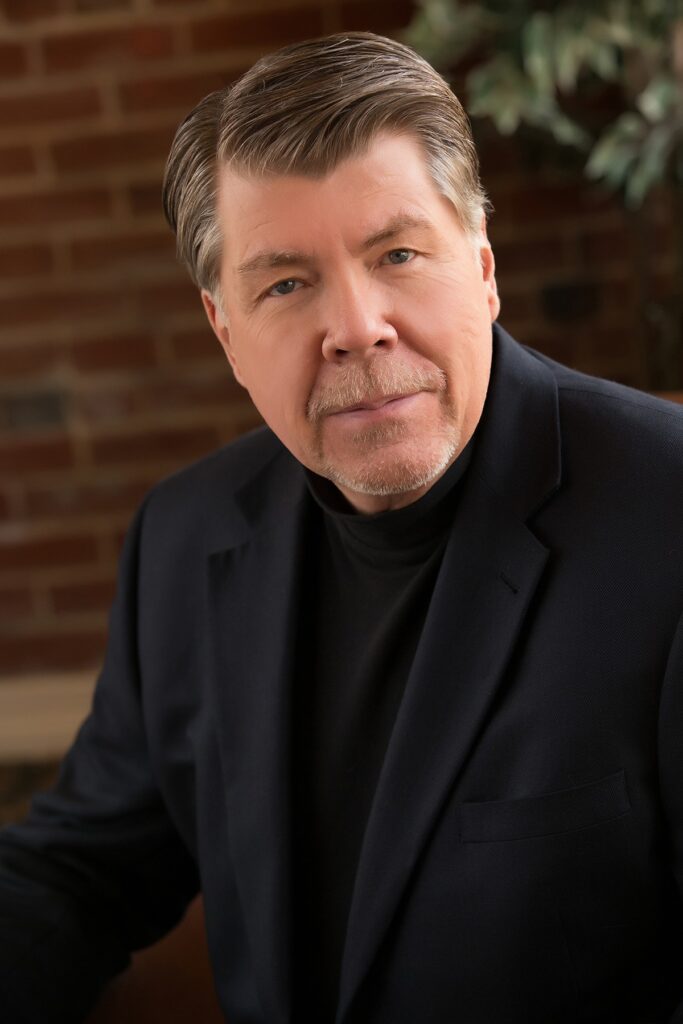
Kevin Wolf is an award-winning Mystery and Western author. His books include Trailridge (2024), The Homeplace, winner of the 2015 Tony Hillerman Prize and the 2016 Strand Critics Award finalist for Best Debut Mystery. His short story Belthanger received the 2021 Spur Award for Best Short Fiction and his novel, The Bootheel was a 2024 Peacemaker Award finalist.
The legends and landscape of the West are evident in everything he writes. His newest novel, Trailridge, is set against the grandeur of Colorado’s Rocky Mountain National Park and the 1982 Lawn Lake Flood. Those who visit Rocky often or have chosen the national park for their once-in-a-lifetime destination will recognize the mountains, valleys, rivers, and the twists and turns of Trailridge as this story races to its climax.In The Homeplace, a schoolboy hero returns after sixteen years to solve a murder in a windswept, dying town on the eastern plains of Colorado. In his short story Belthanger, readers are given a glimpse of a 1950s small town, soon to be bypassed by the new Interstate Highway System, and the drama that unfolds on the town’s darkened streets one night. The BootHeel is a coming-of-age tale of a teenage orphan and an aging gunman as they follow a treasure map into Mexico as the nineteenth century draws to its end.
Kevin Wolf is a member of Western Writers of America, Mystery Writers of America, and serves as Vice President of Rocky Mountain Fiction Writers. He facilitates a weekly critique group for other writers. The great-grandson of Colorado homesteaders, he enjoys fly fishing, old Winchesters, and almost every 1950’s Western movie. He lives in Estes Park, CO with his loving and patient wife.
Contact Links
Website: https://kevinwolfstoryteller.com
Facebook: http://www.facebook.com/Kevinwolfstoryteller
Goodreads: https://www.goodreads.com/book/show/213074095-trailridge
Purchase Links
Giveaway
$5 Amazon Gift Card + eBook Copy
Tour Schedule
November 17 – Books 1987 – Spotlight
November 18 – Sarandipity’s – Excerpt
November 19 – The Faerie Review – Spotlight
November 20 – Nana’s book Reviews – Spotlight
November 21 – The Avid Reader – Interview
November 24 – Texas Book Nook – Review
November 25 – Iron Canuck Reviews – Review
November 26 – Always Reading – Interview
November 27 – Tea Time and Books – Spotlight
November 28 – Sandra’s Book Club – Review
December 1 – Book Corner News and Reviews – Spotlight
December 2 – Book Junkiez – Excerpt
December 3 – Boys Mom Reads – Review
December 4 – Crossroad Reviews – Spotlight
December 5 – Liliyana Shadowlyn – Spotlight
December 5 – RABT Reviews – Wrap Up
